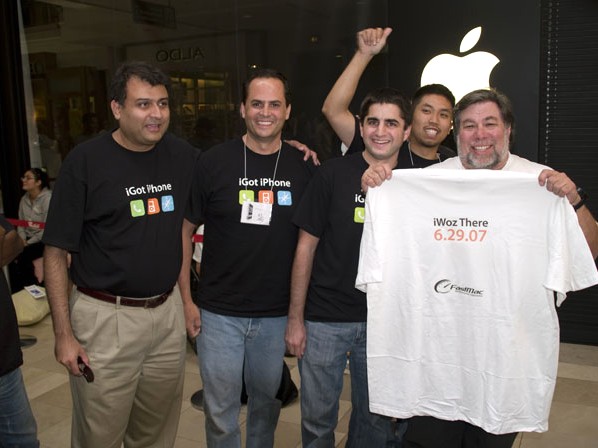If it were any other company, an executive going on the record with an unfavorable comment regarding the cloud when his or her company was a major player in that space would have been met with swift punishment. But this is Apple and the executive in question is Steve Wozniak, the outspoken tech activist and everyone’s favorite geek who doesn’t shy away from criticizing anything and anyone, even the company he co-founded.
Following a special performance of Mike Daisey’s monologue “The Agony and the Ecstasy of Steve Jobs”, the Woz took the stage for a Q&A session with the audience. His take on the cloud (and consequentially Apple’s iCloud)?
It’s a ticking privacy bomb waiting to explode and nuke our digital selves from orbit. We cannot even begin to wrap our heads around such a security nightmare because most of us haven’t been through a mass-scale cloud disruption (yet). Those BlackBerry email server outages and T-Mobile’s Danger incident? Just timely warning signs of things to come.
TIMELY: Conveniently, AT&T just suffered what one blog described as a “massive outage”.
Robert MacPherson, reporting for Agence France-Presse, writes that Woz is losing sleep over the cloud’s potential to seriously disrupt our lives should anything go terribly wrong:
I really worry about everything going to the cloud. think it’s going to be horrendous. I think there are going to be a lot of horrible problems in the next five years.
He’s right.
Case in point: two separate iCloud incidents in June and July briefly knocked off popular services like instant messages and email on the millions upon millions of iPhones, iPods and iPads.
Apple did resolve service interruption in a matter of hours, but customers were nevertheless enraged and disgruntled even if their data was kept intact.
But what if it was a longer disruption and you were unable to access your iCloud contacts, calendars and photos for weeks or months?
And what happens if data gets wiped out as a result of poor cloud maintenance?
Who’s responsible? Who do I sue?
And things can always get worse and beyond repair.
It seems these questions are on Woz’s mind, too.
With the cloud, you don’t own anything. You already signed it away through the legalistic terms of service with a cloud provider that computer users must agree to.
True that.
Cloud providers confuse customers with pages of legal mumbo jumbo that people just glance over briefly before hitting the “I Agree” button. In case of an incident, the legalities we all easily agreed to usually absolve a cloud provider of any serious repercussions related to loss of data.
The legalities also help these monopolies change service terms per their whim. For example, I found out a couple times that the apps and movies I had previously bought were no longer available on iTunes.
No, I wasn’t backing up anything back then.
I know, my fault.
I want to feel that I own things. A lot of people feel, ‘Oh, everything is really on my computer,’ but I say the more we transfer everything onto the web, onto the cloud, the less we’re going to have control over it.
He nailed it.
I don’t own much these days.
Apple’s iCloud facility in North Carolina that holds all your digital stuff.
I tend to rent as much as I can in order to free myself from the burden and stress that comes with owning things.
I pay for my music through Spotify.
My iCoud keeps my iOS devices backed up and in sync.
Dropbox has my important documents the Google cloud stores my digital life from Android devices.
Yeah, I also back up my Mac to a 3TB Time Capsule with Time Machine, but not everything that is synced wirelessly via iCloud (or some other cloud) gets stored on my Mac.
If anything goes south with the cloud, my digital life will take a hit.
That’s why I don’t feel 100 percent safe all the time and it’s not like I haven’t invested in backup strategies.
I want to believe that Apple is on top of things and well prepared for a major data loss incident.
Perhaps that’s what an upcoming tactical data center is for?
I’m not even remotely prepared for anything like the 2009 Sidekick data loss.
How about you?
Do share your great backup strategies and tips with others down in the comments.

